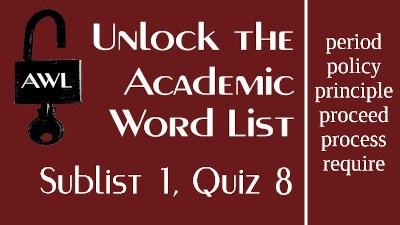AWL Sublist 1, Quiz #8 period, policy, principle, proceed, process, require
About the quiz

This is the eighth quiz in the Unlock the Academic Word List series. This quiz covers the eighth set of six words from sublist 1 of the Academic Word List, namely: period, policy, principle, proceed, process, require. If you haven't studied the words before, below is all the information you need, including part of speech, example sentences, and common collocations from the Academic Collocation List (ACL). Start studying them now!
Please log in to access quiz.
Learning Outcomes
By completing each quiz in the Unlock the Academic Wordlist series, sublist 1 (10 quizzes in total), you will:
- understand the meaning(s) of each sublist 1 word in academic use;
- learn to use vocabulary productively by focusing on word form, word family and example sentences for each word;
- use collocations from the Academic Collocations List (ACL) to develop knowledge of academic collocations for each word;
- learn patterns of affixes (prefixes and suffixes) for the words under study, e.g. to make noun or adjective forms.
period
[pɪriəd]
noun
1. an amount of time. E.g.: a time period of 30 years, hastened the period of time of his recovery, Picasso's blue period [Syn: time period, period of time]
2. a unit of geological time during which a system of rocks formed. E.g.: ganoid fishes swarmed during the earlier geological periods [Syn: geological period]
3. the interval taken to complete one cycle of a regularly repeating phenomenon.
4. a stage in the history of a culture having a definable place in space and time. E.g.: a novel from the Victorian period [Syn: historic period, historical period]
n (thing)
period, periodical
adj
periodic, periodical
adv
periodically
Collocations from the ACL
adj+n: brief period, earlier period, entire period, extended period, given period, historical period, initial period, short period, whole period.
policy
[pɑləsi]
noun
1. written contract or certificate of insurance. E.g.: you should have read the small print on your policy [Syn: insurance policy, insurance]
2. a line of argument rationalizing the course of action of a government. E.g.: they debated the policy or impolicy of the proposed legislation
3. a plan of action adopted by an individual or social group. E.g.: it was a policy of retribution
n (thing)
policy
Collocations from the ACL
adj+n: current policy, economic policy, educational policy, effective policy, environmental policy, foreign policy, key policy, national policy, public policy, social policy.
n+n: government policy, security policy.
principle
[prɪnsəpəl]
noun
1. (law) an explanation of the fundamental reasons (especially an explanation of the working of some device in terms of laws of nature). E.g.: the principles of internal-combustion engines [Syn: rationale]
2. a basic truth or law or assumption. E.g.: the principles of democracy
3. a rule or law concerning a natural phenomenon or the function of a complex system. E.g.: the principle of the conservation of mass, the principle of jet propulsion [Syn: rule]
4. a basic generalization that is accepted as true and that can be used as a basis for reasoning or conduct. E.g.: their principles of composition characterized all their works [Syn: rule]
n (thing)
principle
adj
principled
opposite
unprincipled
Collocations from the ACL
adj+n: basic principle, established principle, ethical principle, fundamental principle, general principle, guiding principle, key principle, main principle, moral principle, organising principle, underlying principle.
proceed
[prəsid]
verb
1. follow a procedure or take a course. [Syn: go, move]
2. continue a certain state, condition, or activity. [Syn: continue, go on, go along, keep]
n (thing)
procedure, proceedings
verb
proceed
verb forms
proceeded, proceeding, proceeds
adj
procedural
Collocations from the ACL
v+n: adopt (a) procedure, describe (a) procedure, follow (a) procedure, use (a) procedure.
process
[prɑses]
verb
1. perform mathematical and logical operations on (data) according to programmed instructions in order to obtain the required information. E.g.: The results of the elections were still being processed when he gave his acceptance speech
noun
1. a sustained phenomenon or one marked by gradual changes through a series of states. E.g.: events now in process, the process of calcification begins later for boys than for girls
2. (psychology) the performance of some composite cognitive activity; an operation that affects mental contents. E.g.: the process of thinking [Syn: cognitive process, mental process, operation, cognitive operation]
3. a particular course of action intended to achieve a result. E.g.: it was a process of trial and error [Syn: procedure]
n (thing)
process
verb
process
verb forms
processed, processes, processing
adj
processed
Collocations from the ACL
adj+n: complex process, continuous process, creative process, democratic process, developmental process, due process, dynamic process, evolutionary process, natural process, ongoing process, slow process, underlying process.
n+n: assessment process, learning process, thinking process, thought process, information processing.
v+n: process data, process information, begin (a) process, describe (a) process, start (a) process.
require
[rikwaɪɜr]
verb
1. require as useful, just, or proper. E.g.: success usually requires hard work [Syn: necessitate, ask, postulate, need, take, involve, call for, demand]
2. have need of. [Syn: want, need]
3. make someone do something. [Syn: command, compel]
4. consider obligatory; request and expect. E.g.: We require our secretary to be on time [Syn: ask, expect]
n (thing)
requirement
verb
require
verb forms
required, requires, requiring
adj
required
Collocations from the ACL
adj+n: functional requirement, legal requirement, minimum requirement.
v+n: require consideration, require knowledge, require resources, meet (a) requirement.
Definitions taken from WordNet 3.0 Copyright 2006 by Princeton University. All rights reserved.
THIS SOFTWARE AND DATABASE IS PROVIDED 'AS IS' AND PRINCETON UNIVERSITY MAKES NO REPRESENTATIONS OR WARRANTIES, EXPRESS OR
IMPLIED. BY WAY OF EXAMPLE, BUT NOT LIMITATION, PRINCETON UNIVERSITY MAKES NO REPRESENTATIONS OR WARRANTIES OF MERCHANT-
ABILITY OR FITNESS FOR ANY PARTICULAR PURPOSE OR THAT THE USE OF THE LICENSED SOFTWARE, DATABASE OR DOCUMENTATION WILL NOT
INFRINGE ANY THIRD PARTY PATENTS, COPYRIGHTS, TRADEMARKS OR OTHER RIGHTS.
Pronunciation of words is adapted from The Carnegie Mellon University Pronouncing Dictionary.
